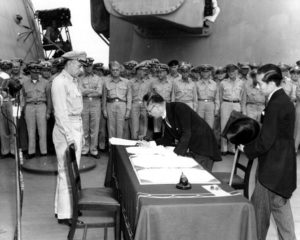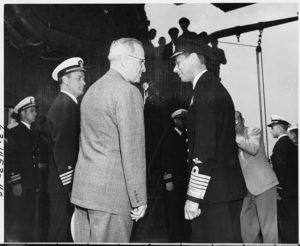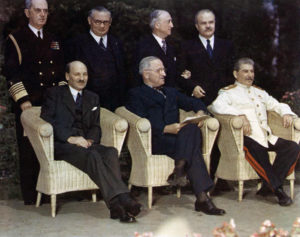The use of dogs in warfare dates to ancient times. The US K-9 Corps was created on 13 March 1942.
The use of dogs in warfare dates to ancient times. The US K-9 Corps was created on 13 March 1942.

Les Parisiennes —– by Anne Sebba (Weidenfeld & Nicolson, UK/St. Martin’s Press, NY, 2016) [Photograph by Edith-Mary Smith]
Rick says, “I remember every detail. You wore blue; the Germans wore grey.”
Those lines were spoken in a movie about a memorable time in the history of Paris, the City of Light, which was very much a city of women during 1940—1944, when Paris was occupied by the German army.
Anne Sebba has written a remarkable book, Les Parisiennes, describing Paris and the lives of its women during that dark period, les Années Noires.
So many Frenchmen had been captured or were fighting overseas or were forced to work in factories, far from home. To a large part, it was left to the women to face the conquerors. Increasingly desperate for food, the women of Paris, whether wealthy or poor, became engaged in the everyday struggle to survive.
Sensitive as well as thorough, Les Parisiennes records the details of the world of women in wartime Paris, from Elizabeth Arden’s paint-on stockings to the cost of a packet of cigarettes, from French traitors to heroines, such as Odette, and let’s not forget the German women of Paris, the Blitzweiben—so-called ‘little Grey Mice’—who were posted to the city and saw Paris from the eyes of the foreign tourist. Neither does Anne Sebba forget the brave Frenchwomen who perished, nor those who were deported and endured the hell of concentration camps, like Ravensbrück.

March Violets (A Bernie Gunther book) — by Philip Kerr (Penguin, 1989) [Photograph by Edith-Mary Smith]
March Violets is the title of the first book in the trilogy Berlin Noir, written by British author Philip Kerr. The trilogy represents the beginning of a long series of novels featuring Kerr’s famous protagonist, Bernie Gunther.
The chances are that you already know Bernie very well. If not, you are in for a treat.
Bernie is a some-time private eye and a some-time detective on the Berlin police force. In March Violets, the year is 1936 and Bernie is hired by a wealthy German industrialist to investigate his daughter’s death: shot in her bed with her husband; her diamonds have disappeared.

Japanese foreign minister, Mamoru Shigemitsu, signs the instrument of surrender on board the USS Missouri, 2 September 1945 [Public domain, wiki]
General Douglas MacArthur signed on behalf of the Allies. Representatives of many Allied nations attended, including General Philippe Leclerc of France and General Arthur Percival of Britain, the latter having only recently been released from a Japanese prisoner-of-war camp.
Also anchored in Tokyo Bay was the British destroyer, HMS Whelp. Its first Lieutenant was Prince Philip of Greece who, in 1947, would marry Princess Elizabeth, the future Queen of England.
The Chinese left local control in the hands of the Vietnamese provisional government which was headquartered in Hanoi and led by Vietnamese nationalist, Ho Chi Minh.
The Potsdam Conference had assigned the southern part of the country to Allied Southeast Asia command and the British arrived in Saigon with the French, who moved to reestablish their control.
Thus Vietnam became divided.
It was the first time that the Japanese People had heard the voice of their Emperor.
Late on the night before the broadcast, over a thousand troops attacked the Imperial Palace, hoping to prevent the transmission from taking place. They were eventually driven off and the recording of the Emperor’s speech was transmitted as intended.
The necessity of using the atomic bomb is still debated today.

President Harry S. Truman meets with King George VI aboard the USS Augusta off the coast of Plymouth, England, 2 August 1945 [Public domain]
The atomic bomb was a focus of discussion. At least one of Truman’s party, Admiral William Leahy, was sure that the power of the bomb had been exaggerated and remarked that it sounded like a ‘professor’s dream.’
Later, after he had become fully aware of the bomb’s destructive power, Leahy condemned the atomic bombing of Hiroshima and Nagasaki as barbaric.

Clement Attlee and King George the Fifth in the grounds of Buckingham Palace, July 1945 [Public domain, wiki]
The Labour Party’s platform was based upon full employment and social reform, namely the sharing of wealth through the introduction of a welfare state.
It would also become the role of Clement Attlee to take part in the final negotiations at the Potsdam Conference.

British Prime Minister Clement Attlee, US President Harry S. Truman, and Soviet Premier Joseph Stalin, Potsdam, July 1945 [Public domain, wiki]
Three countries participated: The Soviet Union—represented by Joseph Stalin, the United States—represented by Harry S. Truman (who had become president following the death of President Roosevelt), and Great Britain—represented at first by Winston Churchill and then by Clement Atlee, who became prime minister as a result of the Labour Party winning the July 1945 general election.
The continuation of the war against Japan was a major item on the agenda. So was the re-organization of post-war Europe, including moving the boundary of Poland westward into Germany.
Meanwhile, a top-secret telegram was sent from Washington to Potsdam, to inform the US Secretary for War, Henry Stimson, that the atomic bomb had been successfully tested at Alamogordo in New Mexico.